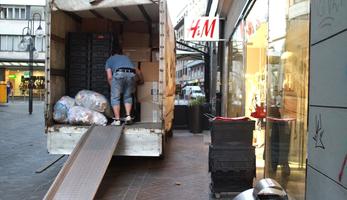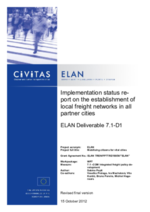Integrated freight policy development
Thematic areas
Urban logistics
Summary
Through the establishment of local freight networks with representation from a range of stakeholders, CIVITAS cities led by Ljubljana developed better-informed, integrated freight policy. The cities defined best practice and promoted sustainable urban freight solutions.
Implementing sustainable mobility
A number of CIVITAS Plus cities have identified local freight networks as a crucial prerequisite for the successful implementation of sustainable urban freight solutions. The goal of this measure was to establish networks in each of the partner cities that will include representatives from a vast range of stakeholders such as freight companies, public transport operators, transport authorities, drivers, local businesses and the police.
The key objectives of the measure were to:
- Promote solutions for freight delivery;
- Enhance the understanding between local authorities and the freight sector;
- Increase awareness and knowledge of freight issues;
- Stimulate best practice through the exchange of information and ideas; and
- Increase the level of cooperation and efficiency.
- The network has been functioning as an advisory body and supporting group throughout the project cycle. It has also been acting as a key dissemination channel at the local and national level. Sustainable urban freight needs to take into account a range of issues such as logistics, sustainable urban transport plans and trade-offs between sustainable transport and economic vitality.
The city of Ljubljana established its first local freight network in 2006. To date, Ljubljana has a network of ten stakeholders from the public and private sector that have been interested in collaboration. It is made up of representatives from city administration, road hauliers and logistics companies, retailers and service providers, manufacturing companies, couriers, access restriction managers and research organisations. Ljubljana has been leading the process of establishing new freight networks in other CIVITAS ELAN cities.
Progress
In the start-up phase, local freight networks were established in all partner cities. Each network was tailored to the respective city’s needs and level of user acceptance. The cities stress that it is important to include representatives from the entire transport chain, from suppliers to customers, which they did. Active participation in and support for the freight network was formalised through a memorandum of understanding or a similar agreement among members.
In each city, 10-20 partners gathered to join the freight network and work together in close collaboration with the CIVITAS ELAN consortium throughout the project lifetime. The discussions and work of the networks influenced and informed about the working practices, policies and plans of the members and promoted best practice more widely. The local networks were managed through periodic working meetings, approximately bi-annually. At these local meetings, the partners established stakeholders’ needs, plan dissemination actions, and discuss operational issues and evaluation results.
Outcomes
The urban freight has been approached in a more cooperative manner that includes all stakeholders. Promotion of freight delivery solutions has been the key activity so far and it will continue.








